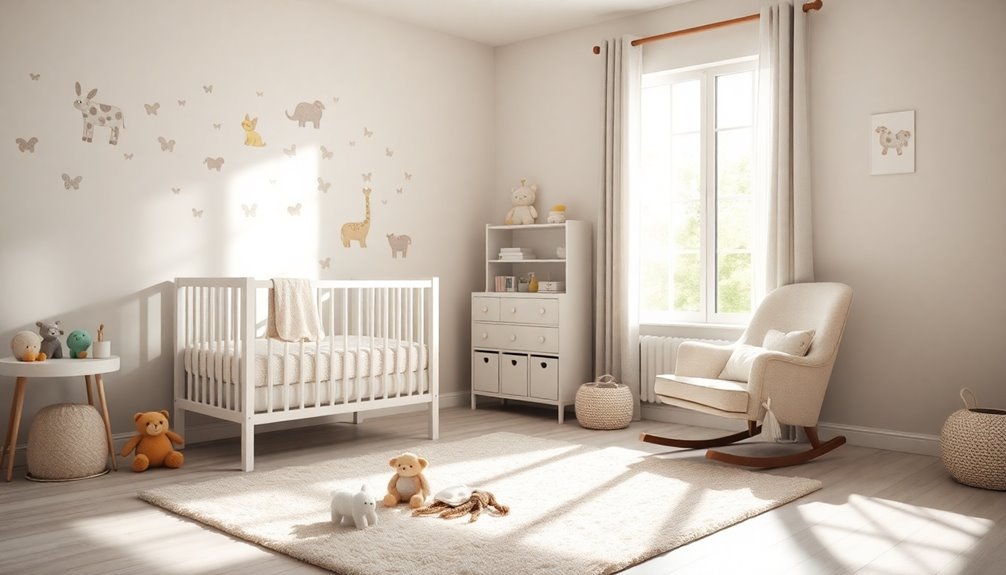It might surprise you, but the best time to move your baby to their own room is usually between 6 to 9 months. The American Academy of Pediatrics recommends room sharing for at least the first six months to lower the risk of SIDS. Once your baby shows signs of readiness, like outgrowing their bassinet or frequent night wakings, it may be time to shift. Want to find out tips for making the shift smoother? Keep going!
Key Takeaways
- The American Academy of Pediatrics recommends moving the baby to their own room between 6 to 9 months of age for safety and sleep quality.
- Room sharing for the first six months reduces the risk of Sudden Infant Death Syndrome (SIDS) significantly.
- Signs that indicate readiness for their own room include frequent night wakings or outgrowing the bassinet.
- Transitioning earlier, around 4 months, may help establish better sleep patterns for the baby.
- Consult your pediatrician to determine the best timing based on the baby's development and family dynamics.
When Should My Baby Sleep in Their Own Room?
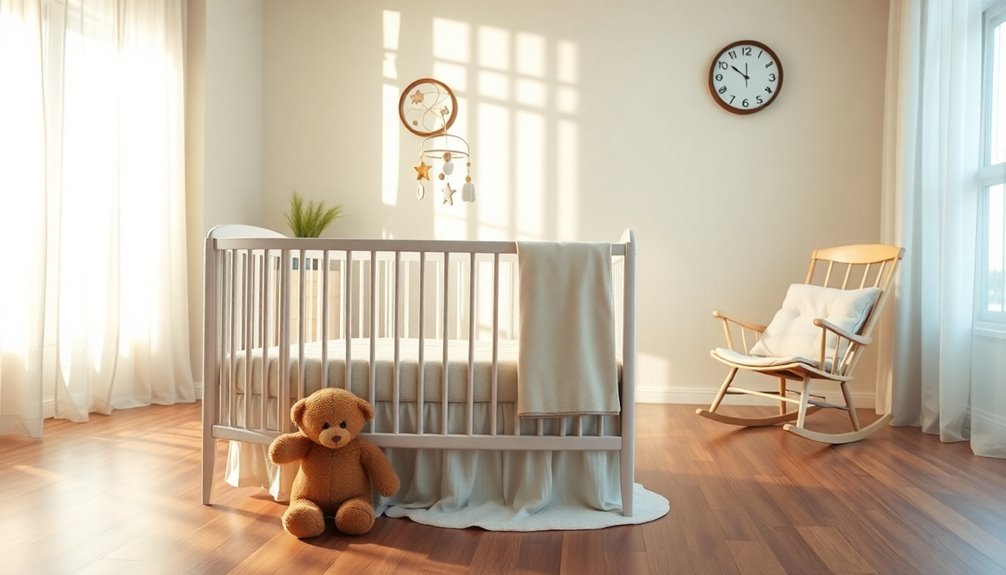
When should you consider moving your baby into their own room? The American Academy of Pediatrics recommends room sharing for at least the first six months to reduce the risk of Sudden Infant Death Syndrome (SIDS).
Consider room sharing for at least the first six months to lower the risk of SIDS.
After this period, shifting to their own room often makes sense, typically between 6 to 9 months, depending on your baby's readiness and family dynamics.
If your baby experiences frequent night wakings or has outgrown their bassinet, it might be time to make the move.
Research suggests babies in their own room before 4 months may develop better sleep patterns, including longer sleep durations.
Whatever you decide, make certain you maintain safe sleep practices, like placing your baby on their back in a crib free of soft bedding.
What Does the AAP Say About Room Sharing?
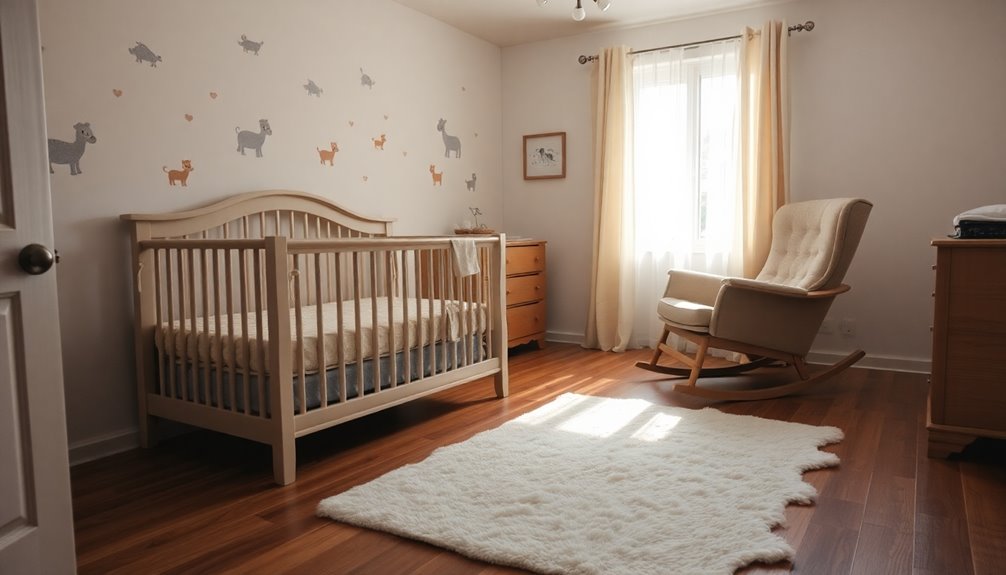
The American Academy of Pediatrics (AAP) strongly recommends room sharing for your infant during the first six months to help lower the risk of Sudden Infant Death Syndrome (SIDS).
By keeping your baby close in their own crib or bassinet, you can guarantee safety while also enjoying the benefits of being nearby.
Just remember to follow safe sleep guidelines to create a secure environment for your little one.
Room Sharing Benefits
Sharing a room with your baby can greatly enhance their safety and well-being during those essential early months. The American Academy of Pediatrics (AAP) recommends room sharing for at least the first six months to reduce the risk of Sudden Infant Death Syndrome (SIDS) by up to 50%.
This arrangement makes nighttime feedings easier, allowing you to comfort your infant without disruptive movements. Room sharing also lowers the likelihood of sleep-related deaths, making it a crucial safety measure.
However, it's important to distinguish room sharing from bed sharing. The AAP emphasizes safe sleep practices, like placing your baby in a firm crib or bassinet, ensuring they sleep on their back, and avoiding soft bedding to promote a safe sleep environment.
Safety Guidelines for Parents
Although many parents find comfort in having their baby close by, it's crucial to follow the American Academy of Pediatrics (AAP) guidelines to guarantee a safe sleeping environment.
The AAP recommends room sharing for at least the first six months, which can reduce the risk of Sudden Infant Death Syndrome (SIDS) by up to 50%. However, this doesn't mean bed sharing; your baby should sleep in a crib or bassinet within your parents' room.
Extended room sharing beyond four months can lead to sleep disruptions and unsafe practices. Consult with pediatricians about the best timing for moving your baby to their own room while adhering to safe sleep guidelines to assure a secure and healthy sleeping space for your little one.
Are There Any Concerns for Room Sharing Beyond the First Few Months?
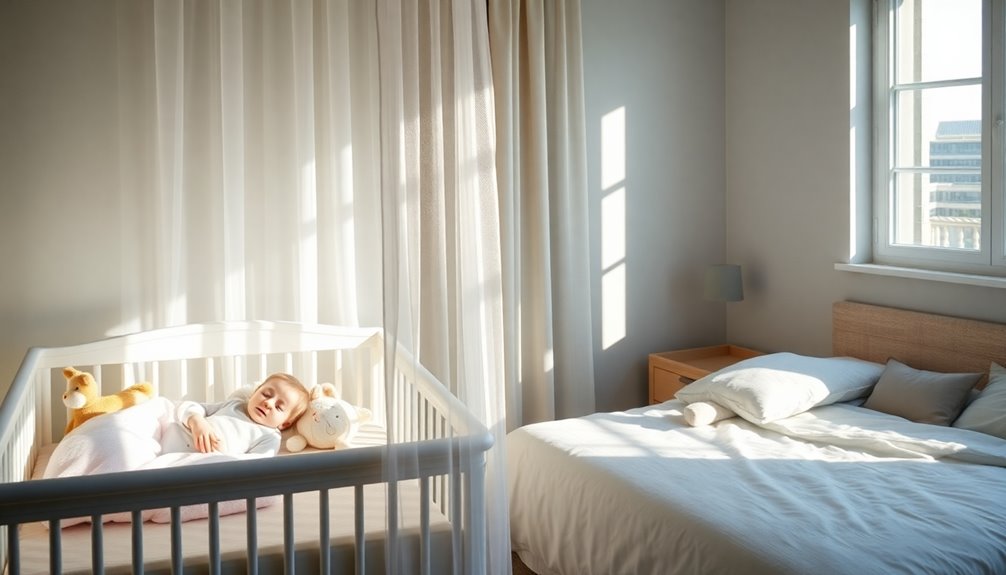
As your baby grows, room sharing can lead to more nighttime awakenings that disrupt your sleep.
Beyond four months, the risks of unsafe sleep practices increase, raising concerns about SIDS.
It's essential to evaluate your baby's developmental readiness and the impact on your family's overall well-being.
Sleep Disruptions for Parents
When you choose to room share with your baby, sleep disruptions can become a significant concern, especially after the first few months. Many parents report decreased sleep quality due to their babies waking frequently.
This can lead to:
- Increased likelihood of co-sleeping
- Inconsistent bedtimes for both parents and baby
- Changes in family relationships
- Heightened sleep deprivation
- Negative impacts on mental health
Extended room sharing often complicates sleeping arrangements, making it harder for parents to establish routines.
As your baby grows, these disruptions may become more pronounced, ultimately affecting your well-being and family dynamics. It's important to recognize that establishing personal boundaries can be crucial in maintaining healthy sleep patterns for everyone involved.
It's vital to weigh these factors carefully when deciding how long to maintain room sharing for the sake of everyone's sleep quality and mental health.
Increased SIDS Risks
Room sharing can provide comfort and convenience in the early months, but it also raises important safety concerns as your baby grows.
The American Academy of Pediatrics (AAP) recommends sharing a room for at least six months to reduce Sudden Infant Death Syndrome (SIDS) risks.
However, extended room sharing can lead to sleep disturbances for both you and your infant, increasing the likelihood of unsafe sleep practices.
Research shows that babies sharing a room after four months often wake more frequently, impacting baby sleep and parents' sleep.
Additionally, the risk of unsafe practices, like bed sharing, rises with longer room sharing, making it essential to reflect on moving your baby to their own space for safer sleeping arrangements. Hydration is crucial for maintaining optimal brain function, which can support better sleep quality for both infants and parents.
Developmental Readiness Factors
While many parents find comfort in sharing a room with their baby during those initial months, developmental factors often signal when it might be time for a change.
Room sharing beyond the first few months can negatively impact sleep quality due to disturbances from parents. Recognizing the signs of readiness helps guarantee a smoother adjustment to an own room.
Consider these factors:
- Baby rolls over
- Outgrows the bassinet
- Achieves longer sleep stretches (six hours or more)
- Begins sleep training
- Consistent night wakings
Prioritizing these developmental readiness cues can enhance your baby's sleep experience and minimize risks like Sudden Infant Death Syndrome, allowing both you and your baby to thrive.
How Does Room Sharing Reduce SIDS?
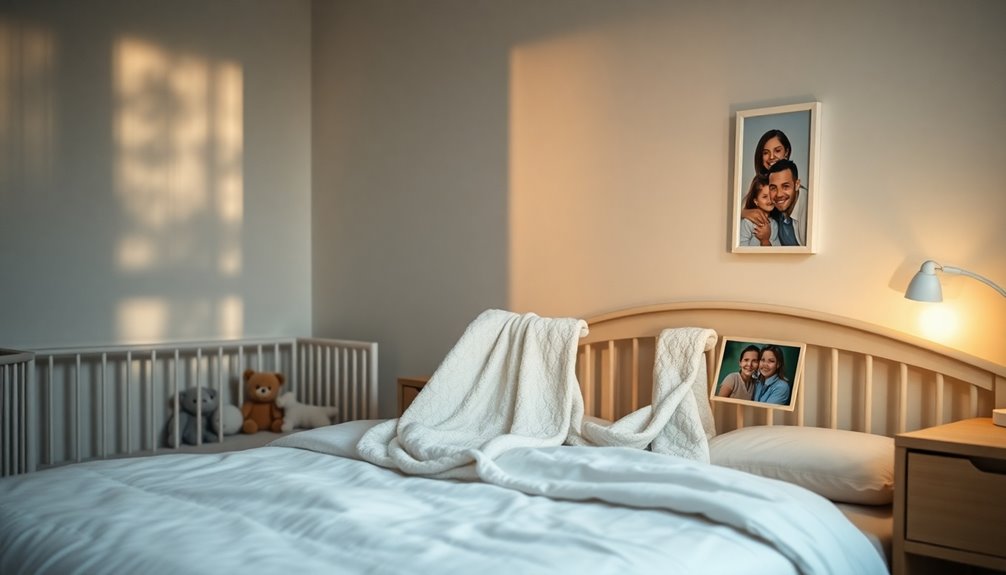
Sharing a room with your baby can greatly lower the risk of Sudden Infant Death Syndrome (SIDS). The American Academy of Pediatrics recommends room sharing for at least the first six months, potentially reducing the risk by up to 50%.
Being close allows you to monitor your infant more effectively, addressing any breathing issues quickly. Room sharing also encourages breastfeeding, which offers protective benefits linked to SIDS reduction.
Room sharing enhances monitoring and supports breastfeeding, both crucial for reducing SIDS risk.
Additionally, when babies are in their parents' room, they're less likely to encounter unsafe sleep practices that contribute to SIDS. This environment can help infants develop self-soothing skills and establish healthy sleep patterns, further enhancing their safety during sleep.
Prioritizing safe sleep practices in a shared space is essential for your baby's well-being.
Does Moving a Baby to Their Own Room Help Them Sleep Better?
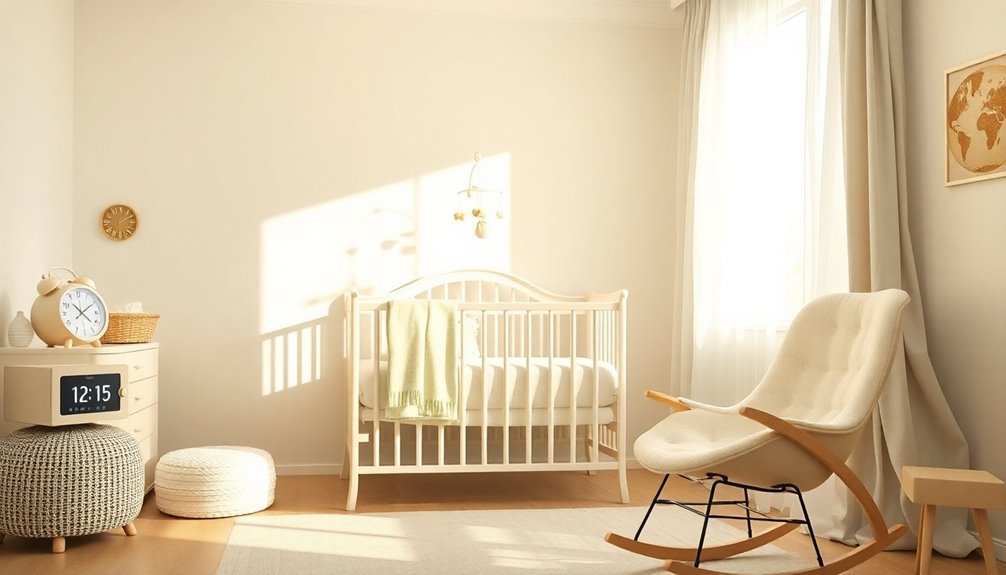
How does moving your baby to their own room impact their sleep quality? Research shows that shifting your baby to their own space can lead to significant improvements in sleep patterns.
Babies who sleep independently often enjoy longer sleep durations and fewer night wakings. While the American Academy of Pediatrics recommends room sharing for at least six months, many parents find that after this period, moving a baby can enhance everyone's sleep quality.
- Babies may have more consolidated sleep.
- Parents can get better rest.
- Night wakings can decrease.
- Longer sleep durations are common.
- Overall family well-being improves.
Tips for Smoothly Transitioning Your Baby to Their Own Room
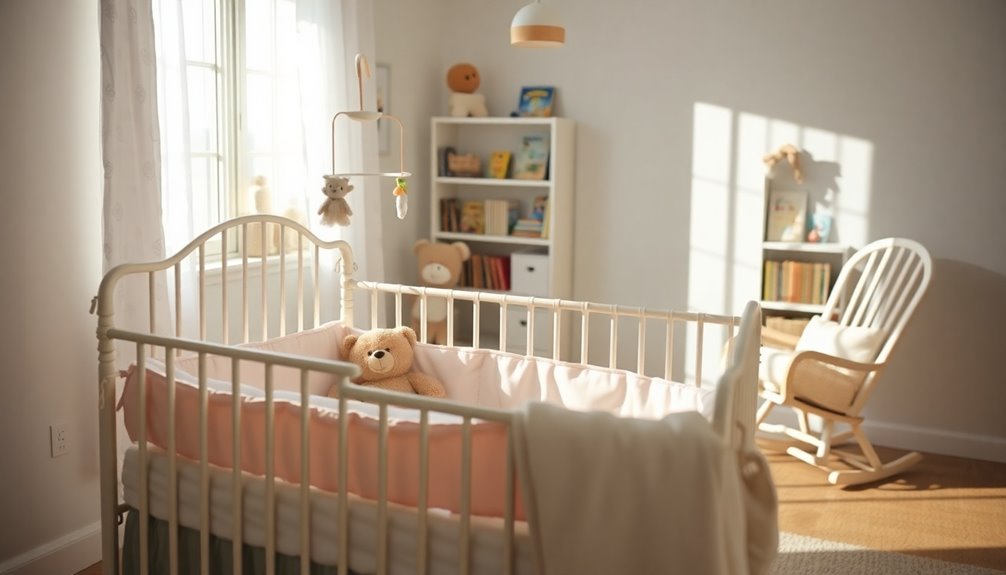
Once you've decided it's time for your baby to have their own room, making the shift can feel intimidating. Start by spending time in the nursery during the day for diaper changes and playtime. Establish consistent sleep cues and routines to create a sense of security. Gradually move the bassinet into the nursery for a few nights before shifting to the crib.
| Tip | Benefit |
|---|---|
| Spend time in nursery | Helps baby acclimate |
| Use consistent cues | Provides a sense of security |
| Gradual shift | Eases adjustment for baby |
Keep a positive atmosphere, as stress can hinder both you and your baby's adaptability. Remember, the adjustment period varies based on your baby's age and temperament.
Frequently Asked Questions
When Should I Transition My Baby to Her Own Room?
You should consider shifting your baby to her own room between 6 to 9 months.
Look for signs like frequent nighttime waking, which might indicate she's ready for her own space.
After 4 months, babies become more aware of their surroundings, making them prone to waking if you're nearby.
Establish a consistent bedtime routine and gradually help her get used to the new room for a smoother shift.
Trust your instincts and your baby's cues!
At What Age Does a Baby Need Their Own Room?
A baby typically needs their own room around 4 to 6 months, especially if they're outgrowing their bassinet or waking frequently at night.
At this stage, you'll notice signs like fewer nighttime feedings and longer sleep stretches.
While the American Academy of Pediatrics recommends room sharing for at least the first 6 months to reduce SIDS risk, it's important to reflect on your family's unique situation and consult your pediatrician before making the change.
What Is the 5-3-3 Rule for Babies?
The 5-3-3 Rule for babies offers a guideline to help you know when your little one might be ready for their own room.
It suggests changing over by 5 months, ensuring they've 3 consistent nighttime feedings, and experiencing 3 sleep stretches of 6 hours or more.
When Can I Stop Room Sharing With My Baby?
You can consider stopping room sharing with your baby around 6 months, but watch for signs of readiness.
If your baby is outgrowing their bassinet, sitting independently, or waking less frequently at night, it might be time to shift.
Start gradually by letting them nap in their own room before moving to full nighttime sleep.
This way, you both can adapt to the change while ensuring a safe sleeping environment.
Conclusion
As you weigh the decision of when to move your baby to their own room, remember this: it's not just about space, but safety and sleep quality too. Imagine the peaceful nights ahead, but also consider the risks of room sharing. What if you could enhance their sleep while keeping them safe? The choice is yours, and the journey can be smooth with the right tips. Are you ready to take that step and discover the difference?
